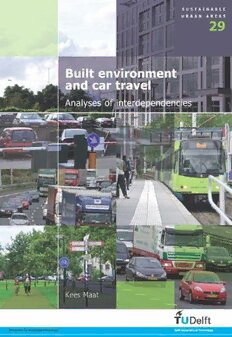
Built Environment and Car Travel: Analyses of Interdependencies - Volume 29 Sustainable Urban Areas PDF
185 Pages·2009·2.992 MB·English
Most books are stored in the elastic cloud where traffic is expensive. For this reason, we have a limit on daily download.
Preview Built Environment and Car Travel: Analyses of Interdependencies - Volume 29 Sustainable Urban Areas
Description:
An academic and policy debate has been running in recent decades on whether and to what extent travel behavior is influenced by the built environment. This dissertation addresses the influence on daily travel distance, chaining behavior, car ownership and car commuting. As cars are the dominant mode of transport, car travel received most attention. The analyses were based on a comprehensive dataset collected in the North Wing of the Randstad in the Netherlands. The study findings indicate that a more compact urban structure reduces car use. However, the effects are small. One important lesson is that behavioral mechanisms are never simple but invariably elicit compensation. The challenge facing planners is to design cities and neighborhoods that make it easier to drive less and that are attractive to live in.IOS Press is an international science, technical and medical publisher of high-quality books for academics, scientists, and professionals in all fields. Some of the areas we publish in: -Biomedicine -Oncology -Artificial intelligence -Databases and information systems -Maritime engineering -Nanotechnology -Geoengineering -All aspects of physics -E-governance -E-commerce -The knowledge economy -Urban studies -Arms control -Understanding and responding to terrorism -Medical informatics -Computer Sciences
See more
The list of books you might like
Most books are stored in the elastic cloud where traffic is expensive. For this reason, we have a limit on daily download.
